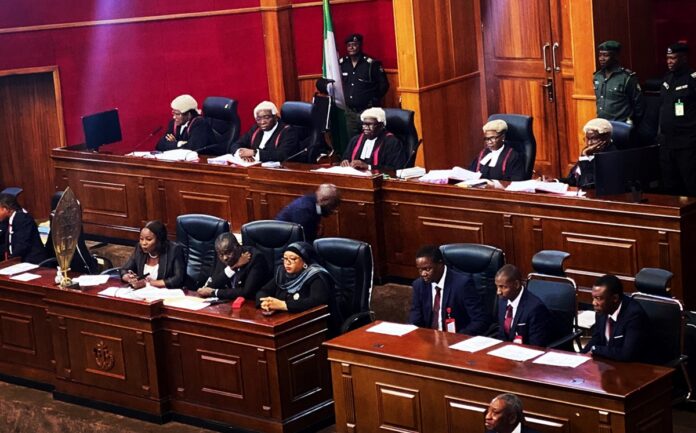In a dramatic turn of events, the Peoples Democratic Party (PDP) and its governorship candidate, Asue Ighodalo, faced sharp criticism from the Edo Gubernatorial Election Petition Tribunal for their failure to present key witnesses during a highly anticipated court session. The tribunal, which had convened in Abuja following its relocation from Benin, was left frustrated as the opposition party failed to make the necessary case in their petition seeking to annul the September 21, 2024 governorship election results in Edo State.
The legal action, filed by the PDP, claimed that the election was marred by significant irregularities and non-compliance with the Electoral Act. The petition also demanded the nullification of the results from the Edo governorship election, which saw Governor Monday Okpebholo of the All Progressives Congress (APC) declared the winner.
On Tuesday, during the first sitting of the tribunal in the Federal Capital Territory, a tense exchange unfolded. PDP counsel, Senior Advocate of Nigeria (SAN) Adetunji Oyeyipo, revealed that several of their witnesses had faced travel disruptions and could not make it to court. Despite previous arrangements, the petitioners were unable to present the witnesses crucial to their case.
“We deeply regret the absence of our witnesses today, my Lords,” Oyeyipo explained. “We ask for another adjournment and assure the tribunal that we will bring as many witnesses as needed in due course.”
However, this explanation did little to appease the tribunal’s three-member panel, led by Justice Wilfred Kpochi. The judge expressed deep dissatisfaction with the repeated delays, stating that such setbacks were not acceptable and could not be overlooked.
“You were given ample time, and now you’re asking for another delay!” Justice Kpochi reprimanded. “Why should we have allocated this day exclusively for your petition when we could have heard other cases? It’s a waste of our time, and that is not acceptable!”
The tribunal’s frustrations were palpable, and the dramatic moment underscored the gravity of the case at hand. The tribunal had initially set aside this specific date for PDP’s petition, a request made by the party itself, which was now being undermined by its failure to produce witnesses. Justice Kpochi’s outburst reflected the growing impatience over the lack of preparedness by the petitioners, signaling that further delays would not be tolerated.
Despite the court’s frustrations, Oyeyipo pleaded for an extension, citing the travel challenges faced by their witnesses. This request was eventually granted, with the tribunal adjourning the hearing until Thursday, giving the PDP one last chance to present its case.
The PDP’s case had already hit a stumbling block with the testimony of their key witness, Mr. Oseyili Anenih. Anenih, who had earlier testified in Benin as the 12th witness for the PDP, provided details about the alleged irregularities during the election. He claimed that the PDP had evidence of vote tampering and manipulation, particularly in 765 of the state’s 4,519 polling units. However, his testimony was not without complications.
Anenih, who served as the Director of Research and Strategy for the PDP during the election, admitted that he did not personally visit every polling unit in question. He argued that the party’s agents had faced significant challenges in transmitting results to the central collation centers, with some data allegedly intercepted or manipulated before reaching the state’s election authorities.
“The results were meant to be transmitted directly to the state collation centers,” Anenih testified. “But many of them never made it, and instead, they ended up in the PDP’s situation room. Had all the lawful votes been properly counted, our candidate, Ighodalo, would have won the election.”
Anenih’s testimony, while significant, also encountered setbacks when cross-examined by the defense teams. When asked by Governor Okpebholo’s lawyer, Mr. Onyechi Ikpeazu, SAN, about the party’s access to critical election data, Anenih acknowledged that they had not been able to access the Bimodal Voter Accreditation System (BVAS) machines used to verify voter identities. He stated, however, that the PDP had obtained screenshots from the BVAS and planned to subpoena the Independent National Electoral Commission (INEC) to produce the machines for further examination.
The cross-examination by APC’s legal team also raised questions about the authenticity of the evidence presented by the PDP. Anenih was forced to admit that none of the polling unit results had been handed to him directly by party agents. When shown a bundle of results, he confirmed that only three out of sixteen copies were stamped, which he described as highly significant.
“To us, those three stamped copies represent nearly 20 percent of the results,” Anenih insisted, trying to underline the importance of what the PDP considered to be credible evidence.
The tribunal’s concerns were not limited to the testimony of Anenih alone. In fact, the absence of the party’s remaining witnesses was a key focus during the hearing, as the tribunal questioned why the PDP had failed to secure the testimonies of these individuals, many of whom had crucial knowledge regarding the election’s alleged discrepancies.
As the case continues, all eyes are on the tribunal to see how it will handle the multiple delays and the growing tensions surrounding the credibility of the election results. The legal battle, which has captured the attention of political observers, seems far from over. While the PDP remains determined to challenge the results, the tribunal’s patience is clearly wearing thin.

